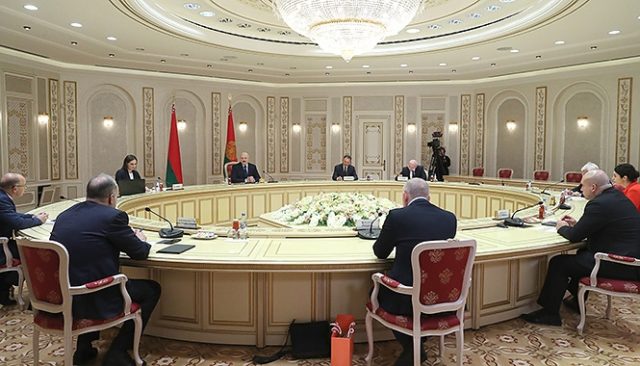
Belarus’s President Lukashenka Talks to Ukrainian Journalists
Publication: Eurasia Daily Monitor Volume: 16 Issue: 133
By:

President Alyaksandr Lukashenka conducted a press conference for Ukrainian journalists in Minsk, on September 26. Compared to Lukashenka’s more regular face-to-face contacts with the Russian media, the scale of this briefing was decidedly smaller. Whereas the 2016 press conference for Russian journalists involved 80 reporters from 44 regions, only six Kyiv-based media outlets, including two press agencies (Ukrinform and Interfax-Ukraine), three TV channels (Ukraine, 112 Ukraine, 1+1) and one newspaper (the government-run Uradovii Courier), were represented last week (Tut.by, September 27). Still, the event lasted 3.5 hours, and the Belarusian president made several meaningful statements on the record.
One of them pertained to his country’s relations with Ukraine. “Ukraine is Belarus’s most important neighbor,” Lukashenka stated, and “one of the main international trade partners, which is why relations with it have always been a priority.” He further asserted, “The United States’ position will not be decisive in relations between Belarus and Ukraine. Our relationship depends only on us. Yes, we will look back at Russia and at the Americans. But we are not all that dependent on them [in what we do]. The closer the relationship, the more obstruction there will be to it because nobody in either [Moscow or Washington] wants our relationships to be all that friendly and close” (President.gov, September 26).
Lukashenka also commented on the talks he and other top Belarusian officials have had in recent months with emissaries from the West. “When we start talking with the Americans, I immediately say: No conversation will take place about our choice between East and West. This is our position.” Alluding to Moscow’s irritation at these contacts, Lukashenka added, “We will determine ourselves what our relations with Russia and China will be, on the one hand, [and] the European Union [and] America, on the other… And you know, nobody took offense… On the contrary, some [Americans] had anticipated my precondition. [Then–US National Security Advisor John] Bolton and the Deputy Secretary of State [John J. Sullivan] both said: We will not raise the either-or issue. No, we want Belarus to contribute to peace and tranquility in Eastern Europe and in Europe in general. We want to see Belarus sovereign and independent. Listen, we [Belarus] do like that position of the USA. We welcome it… We were under American and not just American sanctions. And at the very same time, Russia and America were giving each other a good hug. This did not bother us at all. Why should [our current talks with the United States] bother anyone in Russia? We are not making friends with America at Russia’s expense. This is out of the question” (President.gov, September 26).
The Belarusian leader also dispelled the anxieties associated with Belarusian-Russian integration, assuring his guests that Belarus is no less sovereign a state than Ukraine. Incidentally, earlier, the Belarusian Ministry of Foreign Affairs issued a statement that “the hype about the integration program with Russia has no basis” in reason or fact (Tut.by, September 20). Four days later, Fyodor Lukyanov, Russia’s premier foreign affairs analyst with ties to President Vladimir Putin, averred that “Russia has no need whatsoever to incorporate Belarus” (Eurasia.Expert, September 24). Even Chatham House, the authoritative British think tank, echoed the above disavowals (Chathamhouse.org, September 26).
While some of Lukashenka’s statements at the press conference allayed fears in Moscow, some others effectively boosted them. For instance, Lukashenka described the motives behind Russia’s renewed integration zeal by telling the Ukrainian journalists, “They [Russia] did not succeed in Ukraine. They believe that the Ukrainian authorities dishonestly treated Russians on certain issues; so when they think they can also lose Belarus, to them, it is anathema. This would be even worse than to lose Ukraine… If I were in Putin’s shoes, I would worry, too. Of course, they would like to tie Belarus to Russia in a guaranteed way. I understand that. They cannot lose Belarus. But it is a different matter as to how this is being done” (Tut.by, September 27). Moreover, “I told Putin, if there is any thought that we are ready to become a part of Russia, just get it out of your head,” he declared (Tut.by, September 26).
Scores of other issues were touched upon, too. Thus, when asked directly whether Russia will ever return Crimea to Ukraine, Lukashenka’s response was, “I do not think so. […] even if people ever come to power in Russia who condemn the annexation of Crimea, they will not return it to Ukraine either. Believe me, I know what I am talking about. I cannot imagine what circumstances should emerge for Russia to get out of Crimea” (Belta, September 26). And yet, Lukashenka insisted that Ukraine should remain “united and indivisible,” implying that its “separatist” east would eventually be returned to Ukrainian jurisdiction. Lukashenka also assured that no military threat to Ukraine would ever emanate from Belarus and that he is ready to do whatever it takes to restore peace, including sending Belarusian peacekeepers to Donbas. He pledged to work toward the exchange of the Ukrainian citizen Pavel Sharoiko, sentenced in Belarus for espionage, and Yury Politika, a Belarusian sentenced in Ukraine. Finally, Lukashenka pledged not to make the Russian language a bone of contention in Belarus, while noting that much is being done to popularize Belarusian, which “practically everybody [in Belarus] is familiar with.”
“Lukashenka’s opinion elicits respect even if you disagree with him,” stated Alexander Kharchenko, in charge of Ukrinform and a participant of the event. He emphasized the Belarusian leader’s “stunning candor” and his ability to communicate his “deep and carefully thought-through understanding” of various issues “with gusto” (Belta, September 26).



